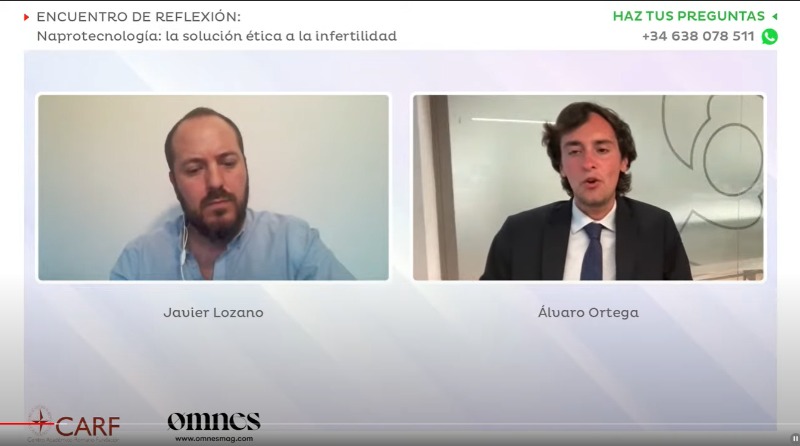
Alvaro Ortega, has explained to us in this Reflection Meeting organized by CARF, that the mission of the Clinica Fertitas is to help marriages with parenting problems. And it does by means of an ethical and natural technique that puts health first: it is known as Naprotechnology.derived from Natural Procreative Technologya new reproductive science that is revolutionizing the world of fertility.
This method is an alternative to artificial techniques such as in vitro fertilization, the system offered by most clinics and professionals to conceive a child. IVF, in addition to causing many health risks and being very expensive, is contrary to the ethical and Catholic principles of many couples. Naprotechnology has opened up great hope for them.
Currently it is estimated that 17% of couples have fertility problems.This is a fact that is on the rise due to various factors, including an unhealthy lifestyle and age: "Many couples delay their age when it comes to seeking a pregnancy and, when they want to, it is often too late," warns Ortega.
Therefore, there are two ways to solve this problem: either with artificial techniques such as in vitro fertilization, which involves tests such as ovarian hyperstimulation of the woman, extracting oocytes and sperm, as well as generating the embryos extrauterinally, or else, address the root problem and investigate the causes why this couple does not conceive a child.
"Not to be forgotten, something that very few experts warn about, that IVF carries major health risks for women that undergoes this type of technique. Occasionally, this type of fertilization can trigger future organic pathologies. Even the conceived child can also develop congenital diseases," clarifies the director of Fertilites.
For these reasons, Alvaro Ortega is committed to Naprotechnology as an ethical solution to infertility. "This is a medical procedure developed in the United States that consists of identify everything that affects male and female fertilityand treats it in a medical and natural way. And it is ethical because there is no human intervention in the creation of that life, nor embryonic manipulation, nor are artificial techniques applied, as occurs in in vitro fertilization," he explains.
Ortega adds how this technique is applied: "A team of expert gynecologists carry out a very exhaustive medical diagnosis and approach with a complete gynecological record and monitoring that allows us to identify the fertility of the woman and her cycle on specific days.
In addition, Naprotechnology also addresses all the pathologies that we find in both men and women: tubal, ovulatory, hormonal, nutritional, clinical, etc.. Once the diagnosis has been made, it applies surgical techniques to heal certain organic pathologies in women (also in men), such as endometriosis, adhesions or myomas, which will have the purpose of cleaning up all these pathologies in order to recover the reproductive capacity", explains Alvaro Ortega.
With this technique, therefore, we cooperate with the health of the man and the woman, and we diagnose everything that affects their fertility. In short, it manages to heal that
"In this way, pregnancy will come naturally as a result of having repaired those health problems that were preventing natural conception. It is true medicine," says the director of Fertilitas.
With Naprotechnology, the couple is accompanied, listened to, guided and given a solution in accordance with their personal morals. In addition, this technique is healthy, ecological, and much more economical than artificial techniques.
"Accompaniment is fundamental. At Fertilitas, the entire team listens to the couple because the couples arrive with many wounds. From the gynecological surgeons to the fertility instructor who specializes in the Creighton method (to learn about the woman's cycle), they are at their service," Ortega points out.
And it accompanies both the woman and the man, because Naprotechnology also diagnoses some male pathologies. "We have just reached an agreement with one of the best andrologists, a specialist in male fertility in Italy, who will collaborate with us in recognizing the most complex causes of male infertility," he announces.

This CARF Reflection meeting can be replayed by clicking on the link
This is the question asked by many couples who want to become parents and have difficulties.
"First of all, I would like to emphasize that in addition to the success in births, this method is presented as a real health system. According to a study conducted In Ireland, 99.5% of married couples who undergo Naprotechnology reach an accurate diagnosis and the causes affecting their fertility are found. When the couple knows the causes, anxiety drops exponentially," says the Fertilitas director.
Once the diagnosis has been made and the possible pathologies have been cured, the efficiency of pregnancies is 52%. Some achieve it in six months and others in two years. And the price of this technique is affordable and infinitely cheaper than IVF.
"Fertilitas is not for profit. I must say that we have very good results in Spain. We are going to present our achievements soon with the Francisco de Vitoria University," Ortega announces.
Despite all the advantages of nanotechnology, neither public health nor physicians promote it. As Alvaro Ortega reminds us, artificial techniques, together with abortion and contraceptives, represent the fourth largest business in the world.
In order to offer alternatives to IVF, the Dr. Thomas W. HilgersThe American Catholic researched a system that would help married couples become parents. Thus developed the Naprotechnology which, as he has stated on several occasions, is the daughter of Humanae Vitae, the encyclical of St. Paul VI.
"Dr. Hilgers saw in the Huamanae Vitae a way of science, going to the source of the problem and explaining well what is meant by the sexuality. This doctor sacrificed a brilliant professional career and, nevertheless, he has been ignored and vetoed in the major scientific journals", denounces Ortega.
However, countries such as Ireland and Poland have realized the benefits of nanotechnology and have introduced it into their public health care system. Some of these physicians who are experts in this fertility technique have been trained by Dr. Hilgers.
According to Alvaro Ortega, "many couples feel cheated with IVF. That is why, The great ambassadors and disseminators of the Naprotechnology are the couples who, after years of anxiety and worry, and some of them having undergone IVF without success and with the emotional exhaustion it entails, have become parents with Naprotechnology. They are the ones who are encouraged to bear witness, even on social networks.
Marta Santín
Journalist specializing in religious information.